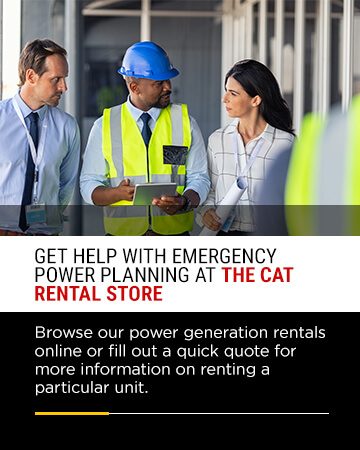
The Importance of Having an Emergency Power Plan
Business owners and contractors know the value of being prepared for emergencies. Interruptions to daily operations can have critical impacts on your bottom line, but having a plan in place can mitigate many of these risks.
With power outages on the rise as more extreme weather events occur, business owners need to prioritize emergency power planning and implement a backup energy plan that’s fast and cost effective. Renting a backup generator to supply temporary power in an emergency can help save you time and money and minimize losses due to sudden power outages.
Jump to a section:
How Power Outages Impact Businesses
Most businesses will experience a power outage at some point, so having an emergency power plan is crucial. Whether it's blizzards, hurricanes, tornadoes or blackouts, businesses must combat various energy threats that can impact their bottom line.
A 2018 survey found that 25% of U.S. businesses experienced a power outage at least once per month. These power outages were most frequently reported by small businesses, who already face a host of other challenges, including increased demand for faster delivery, growing competition and rising operating costs.
Power outages don’t just affect businesses financially. They can also create safety hazards and lead to equipment damage. Below are the three primary threats of power outages that businesses face:
1. Financial Interruptions
There’s an immediate financial risk to businesses in a power outage. Production halts, manufacturing stops and customers can’t receive their services. Without a steady supply of power, workers can’t operate their equipment, and managers and administrative personnel can’t access their digital resources. A sudden power outage completely arrests a company's opportunity to bring in revenue and deliver on service contracts.
During a power outage, revenue stops, but the expenses don’t. When a loss of power interrupts your income, your business starts to incur secondary expenses to make up for the stoppage in productivity. Employers must pay for labor costs because employees are still on the clock. In addition to payroll costs, there are other overhead expenses, like service contracts, which begin to add up without being offset by revenue. Plus, there’s the need to pay for emergency services, like renting a portable power generator to get back up and running.
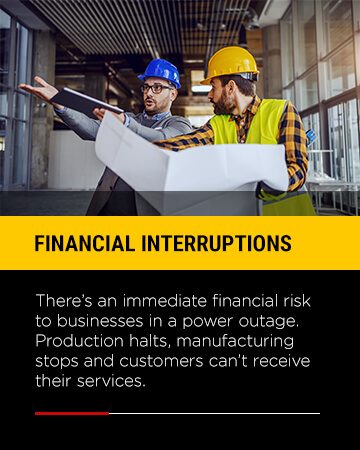
2. Risk of Injury
In many cases, power outages can increase the risk of workplace injury. If you’re running a warehouse, the sudden loss of power can create visual safety hazards that employees need to navigate. In outdoor environments, power outages caused by storms or other weather-related disasters pose immediate risks to worker safety.
It’s important to have emergency procedures that are well planned and communicated with staff. Workers should know how to access flashlights and batteries, emergency supplies and two-way radios. Everyone on site should know how to manually open and close security gates and garage doors in the event of a power outage.
Workplaces should have protocols in place to follow until power is restored or until management can secure a portable backup generator that can continue supplying power.
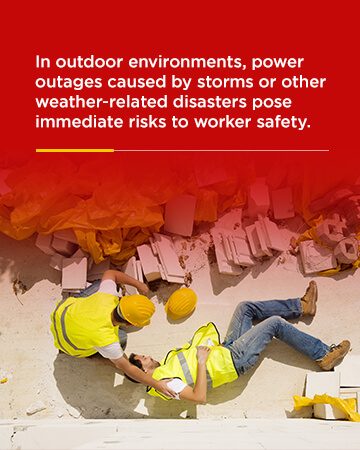
3. Equipment Damage
Power outages can lead to equipment damage. Computers can receive damage to their hard drives, and circuit boards can become overloaded when the power suddenly surges back on. Electrically powered equipment is designed for certain voltages. When the power goes out and is suddenly restored, it can cause a temporary power surge, whereby the voltage is increased and overloads your equipment.
When overvoltages occur simultaneously across numerous equipment and circuit boards, your equipment won’t be able to power back on. Having surge protectors in place can reduce the risk of equipment damage.
An emergency power supply system can deliver the right voltage to your equipment prior to the grid power being restored, which can protect the equipment from damage.
Tips for Emergency Power Planning
When it comes to planning your emergency power supply system, you need to know how, when and where you’ll get your backup power from. In an emergency, many other local businesses will be looking for backup generators to get them through the power outage. Knowing ahead of time what your exact power supply needs are and where you’ll get your generators from is crucial to saving time and money and mitigating damage and injury.
The below tips can help you formulate your emergency power plan ahead of time so you'll know the type and capacity of generator to rent and from where. You’ll also know where and how to set it up so you can seamlessly implement your emergency power plan without delay.
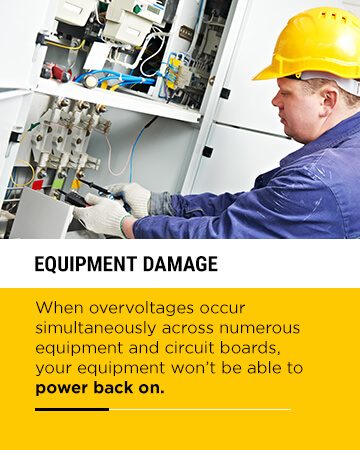
1. Calculate the Amount of Power You Need
The most important step in emergency power planning is understanding how much power you actually need from your emergency power supply system. This will determine the size and capacity of the backup generator you need. The generator needs to be big enough to safely support all your equipment during a power outage. For large construction sites or facilities, you may need multiple units to safely supply enough backup generator power.
Start by accounting for the most important equipment first, followed by any additional systems or products you want powered for a longer-term outage. You can choose to supply enough emergency power for your entire facility or certain emergency functions only.
Here are some examples of equipment to factor in when you calculate your emergency power needs:
- Computers and servers
- HVAC equipment
- Lighting
- Pumps
- Compressed air systems
- Process controls
- Manufacturing and production equipment
Once you’ve created your list, add up the total wattage requirements for each of these systems. You can reference your past 12 months of utility bills. Your account will show you what your peak usage is, indicating a good figure to work with for your emergency power demand.
Another method is to calculate your watts per square foot:
- Calculate the square footage of your facility.
- Add the wattage of each system indicated on the equipment specs or other documentation.
- Divide the total number of watts by your square footage.
Whichever method you use to determine your emergency power requirements, be sure to add a buffer amount you feel comfortable with — between 10% and 25%. Be sure to also consider how long you need power for, which will be different for a daily operation vs. a 24/7 operation.
When making your emergency preparedness plan, you may want to consult an electrician to get an accurate calculation for this step.
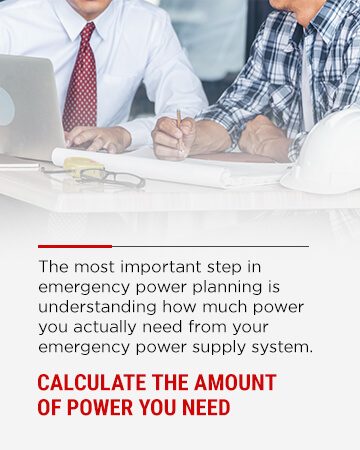
2. Select a Fuel Source
Different types of generators are fueled by different sources. Your choice of fuel type will depend on factors like:
- Cost
- Reliability
- Power output
- Storage space
- Climate
- Carbon footprint concerns
Here is a comparison between different generator fuel options:
- Diesel: Diesel is a common fuel type for both standby and backup generators. It’s an efficient fuel source that can provide enough power for larger facilities. However, diesel emissions can be a downside for some businesses. You’ll also need to figure out where and how to store your fuel supply so it’s accessible and safe. For many businesses, these downsides outweigh the benefit of diesel's cost effectiveness.
- Natural gas: Natural gas is a clean-burning fuel source, and it’s cheaper than diesel. Backup generators that run on natural gas are hooked up to your existing gas meter supplied by the local utility. This makes it a convenient choice for emergency situations because you don’t need to worry about storage concerns and ongoing refueling. Natural gas also performs better in cold conditions because it isn’t highly viscous like diesel.
- Gasoline: Gasoline is not a common fuel source for commercial generators because it doesn’t supply enough power. It’s more suitable for a residential-size generator.
- Propane: Propane is a long-lasting fuel in terms of shelf life, but it burns quickly. This can be a deal breaker for many businesses because the cost can outweigh the benefit. However, propane generators often run quieter than other fuel sources.
The vast majority of commercial backup generators are fueled by diesel or natural gas.
A 2019 report from researchers at the National Renewable Energy Laboratory compared diesel and natural gas fuel sources for backup generators. They found both fuel types had high reliability — 94.7% for diesel and 97.3% for natural gas. Though a 2.6% difference is small, businesses operating in states that experience more power outages than others, such as New Jersey, Florida and Texas, may opt for natural gas because it has the slight edge over diesel in reliability.
3. Choose a Safe Location
Knowing where you’ll place your backup generator is an important safety and convenience factor. Here are some important factors to consider when choosing the type of generator to rent and where to install it on-site:
- Noise: Most generators tend to be noisy, although some are noisier than others. If your workplace is outdoors, it’s important to place the generator as far away from the highest-traffic areas as possible to cut back on disturbances. If your workplace is indoors, consider choosing a unit with a muffler to reduce the sound.
- Vibration: Since generators cause vibrations, having them indoors can disrupt staff and other equipment. It’s important to set them up in a way that minimizes these disturbances.
- Exhaust: Generators exhaust carbon monoxide fumes, so it’s essential to position your generator far away from HVAC vents. Make sure the area you set up your generator is well ventilated. For this reason, it’s always better to place it outdoors.
- Access: Generators have automatic transfer switches that connect directly to your facility’s existing wiring. The closer you can install the generator to your wiring, the easier it will make the process. When choosing your generator rental unit, be sure to get cables that are long enough to reach the tie-in points at your site.
Consulting your equipment rental provider about these concerns ahead of time can help ensure a smooth installation process when you set up your backup generator.
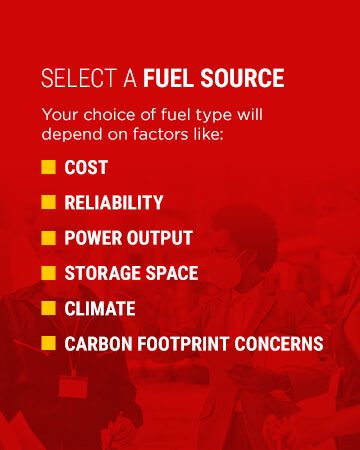
4. Plan for Safe Work Stoppages
Power outages can happen without warning. Depending on the cause, you may be without power for longer than is financially feasible. Whether you manage a construction site or a manufacturing facility, you know steady workflow is important. When a power outage happens at the most inconvenient time, you need to be prepared to handle time-sensitive tasks safely and with minimal disruption to your business.
Have an emergency plan in place with your staff or subcontractors that defines protocols for how to safely stop working when the power goes out. Decide what to do with power tools, work materials, supplies and other production equipment so it doesn’t get damaged, spoiled or ruined before having a chance to complete the task at hand.
The Ready Business Power Outage Toolkit can help your management team work through some of these scenarios.
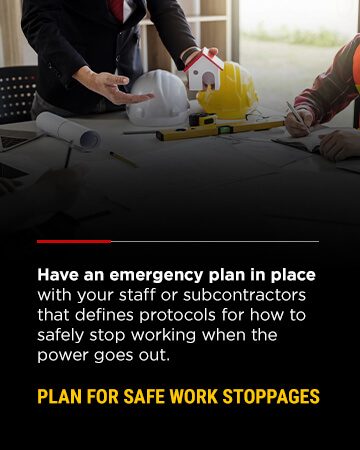
5. Hire Technicians for Installation
Though your equipment rental specialist can help you select the right size generator for your needs, there is some crucial configuration that needs to happen when you set up the generator. If you or someone on your team has electrical expertise, you may be able to install the units yourself. Otherwise, opt to have your rental provider dispatch their technicians to install your generator for you.
Experienced technicians consider critical installation factors like:
- Location, stability and safety
- Proper and secure connections
- Testing for correct functioning
Hiring a technician to have your generator rentals properly installed can also give you a good introduction to operating the system. Technicians can give you a tutorial on how to correctly operate the units according to the instructions. A technician can also provide safety information, such as when and how to refuel a diesel generator correctly.
You'll also need to know how to properly maintain the equipment so it continues working optimally while your emergency situation persists. Providing all this essential information is part of the technician’s job when you hire them to install the equipment.

6. Partner With the Right Rental Provider
With so many factors to consider in having an emergency power plan, it’s vital to consult a professional. When you rent your backup generator, be sure to choose a rental company that has proven expertise. Here are some criteria to look for in a backup generator rental provider:
- Proven record of helping customers select the right size, type and number of generators
- Technicians with training and experience installing commercial generators at various sites and facilities
- Well-maintained equipment that’s reliable and has undergone servicing since its last customer
In emergency situations, you don’t want to be left scrambling to find a generator from any available place. You need a trustworthy provider you can turn to on short notice. By determining the above factors ahead of time and partnering with the right provider now, you can instantly roll out your emergency power plan when the time comes. You’ll already know what your emergency power supply system looks like and where you’ll get it from. This can save your business time and money in the event of an emergency.

Benefits of Renting Backup Generators From The Cat® Rental Store
For help with emergency power planning for your business, choose The Cat® Rental Store. Our dealers are a reliable source for the right size and type of generator you need when you need it. By partnering with The Cat Rental Store for your backup generator power needs, you can benefit from an extensive inventory of trusted equipment, as well as knowledgeable equipment experts who can make the process as smooth as possible for your business under pressing times.
Below are a few reasons to choose The Cat Rental Store for your backup generator rentals:
1. Wide Selection of Generator Sizes
The Cat Rental Store encompasses an extensive dealer network with multiple locations, all equipped with reliable equipment to meet your needs. At The Cat Rental Store, you’ll be sure to find the right size generator rentals you need for your workplace, including:
- Large-capacity generators
- Towable generators
- Trailer-mounted generators
Our dealers offer diesel and natural gas generators in a wide range of sizes and output ratings. Consult the equipment experts at a location near you to find a model with the right features and configurations for your needs.
2. Reliable Equipment
Renting generators from The Cat Rental Store ensures you're getting a high-quality product that’s been tested and well serviced. One of the risks of renting a generator from an unreliable source is that it may not have been properly maintained in between uses.
The Cat Rental Store stands behind the performance of all rental equipment, including generators, by inspecting the equipment at each check-in and check-out. This ensures you always receive a high-performing product, which is especially vital when dealing with emergency power supply systems. The generator rentals you get from The Cat Rental Store are safe and effective products that can get you through an emergency situation without worry.
3. Easy Transportation
Generators at The Cat Rental Store come in convenient configurations for easy transport. Their portability and mobility are a massive benefit to businesses needing an immediate backup energy source. Towable generators are convenient to move between job sites with your own vehicle. With multiple hitch options, you can make sure you have a secure connection between the generator and your truck. Towable generators are also easy to set up, which saves you time during an unplanned power outage.
Larger trailer-mounted generators are mobile energy systems giving you convenient temporary power with high performance. Trailer-mounted generators available for rent from The Cat Rental Store are mounted on Department of Transportation-approved trailers, ensuring you stay compliant during transport from the rental store to your workplace and back.
Our dealers also offer delivery, so you don’t have to worry about transporting the generator to and from the site yourself.
4. Flexible Contract Lengths
Because power outages are unpredictable, you need to know you’ve secured an emergency power supply system for as long as necessary. By choosing The Cat Rental Store, you’ll benefit from flexible rental contracts. Whether you need a short-term solution or a long-term supply of power, our dealers can accommodate. Consult a representative at The Cat Rental Store to learn more about our daily, weekly and monthly rentals that fit your needs.
5. Helpful Rental Equipment Experts
Deciding which type, size and configuration of generator you need can be overwhelming. That’s why you need equipment experts who are experienced at calculating power supply needs. By partnering with The Cat Rental Store, you’ll connect with a rental equipment specialist who can help you figure out your supply requirements and make an appropriate calculation to cover your needs.
Equipment experts will also help you choose the right accessories and cables to match your voltage and amperage. Your representative can guide you through configuring your unit and installing it on-site successfully.
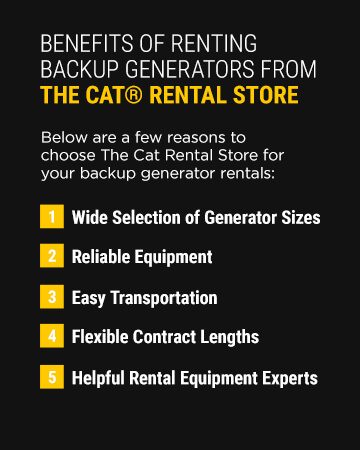
Get Help With Emergency Power Planning at The Cat Rental Store
Being prepared for an emergency power outage is vital for businesses to mitigate disruptions and maintain productivity. Your solution to emergency power supply needs is waiting at The Cat Rental Store. For reliable and cost-effective backup generators for emergency situations, consult your local dealer to find the right solution for you.
Browse our power generation rentals online or fill out a quick quote for more information on renting a particular unit. Stop by one of our more than 1,300 locations worldwide and speak with a representative today. Or call The Cat Rental Store at 1-800-RENT-CAT.
Find The Cat Rental Store Near You